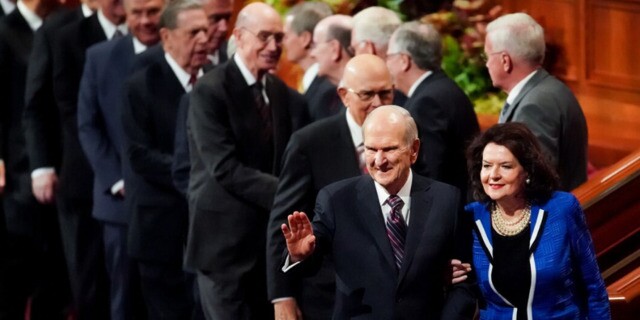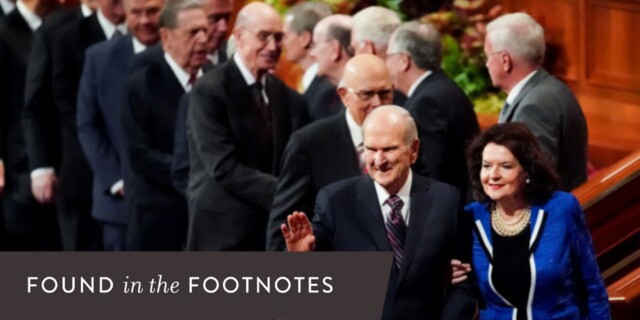Editor's note: Our bi-weekly Friday column, “Found in the Footnotes,” explores some of the footnotes from remarks given by General Authorities and General Officers of The Church of Jesus Christ of Latter-day Saints.
I once heard a saying that Latter-day Saints celebrate three big holidays: Christmas, Easter, and general conference. I find this very fitting as the word holiday comes from an Old English word: “haligdæg” which meant "holy day". Describing conference weekend as a holiday weekend, or a weekend full of holy days, seems rather appropriate to me.
Over the next two days, speakers will share inspired addresses from heaven that will become our study companion for the next six months. However, before we part with the October general conference addresses, I wanted to point out an interesting trend I saw in the footnotes.
After the transcripts of the talks are released, I tally the most-referenced scriptures. As I did this in October, I noticed something unique: the popular verses all had to do with the commandments we keep and the promises we make to God, and in turn, the promises He makes with us.
Covenants—what an important topic.
President Russell M. Nelson once said, “When we realize that we are children of the covenant, we know who we are and what God expects of us. His law is written in our hearts. He is our God and we are His people.”
So, what were these covenant-centric verses? Here is a look at verses that were referenced by at least four speakers.
Matthew 22:37–38: “Jesus said unto him, Thou shalt love the Lord thy God with all thy heart, and with all thy soul, and with all thy mind. This is the first and great commandment.”
- President Russell M. Nelson: “You know and love to obey His two great commandments, to love God and to love your neighbors.”
- President Dallin H. Oaks: “I begin with what Jesus taught were the two great commandments. ‘Thou shalt love the Lord thy God with all thy heart, and with all thy soul, and with all thy mind. This is the first and great commandment. And the second is like unto it, Thou shalt love thy neighbour as thyself.’”
- President Bonnie H. Cordon: “‘As a disciple of Jesus Christ, I strive to become like Him.’”
- Elder Peter M. Johnson: “First, remember that the first and great commandment is to love God with our heart, might, mind, and strength.”
Mosiah 2:41: “And moreover, I would desire that ye should consider on the blessed and happy state of those that keep the commandments of God. For behold, they are blessed in all things, both temporal and spiritual; and if they hold out faithful to the end they are received into heaven, that thereby they may dwell with God in a state of never-ending happiness. O remember, remember that these things are true; for the Lord God hath spoken it.”
- President Russell M. Nelson: “I testify that such preparatory work brings innumerable blessings in this life and inconceivable blessings for the life to come, including the perpetuation of your family unit throughout all eternity ‘in a state of never-ending happiness.’”
- Elder Ronald A. Rasband: “He will be with you, my dear brothers and sisters, and you can, with confidence, look forward to being ‘received into heaven, that thereby [you] may dwell with God in a state of never-ending happiness … for the Lord God hath spoken it.’”
- Elder Gerrit W. Gong: “The ‘happy state of those that keep the commandments of God’ is to be ‘blessed in all things, both temporal and spiritual,’ and to ‘dwell with God in … never-ending happiness.’”
- Elder Ulisses Soares: “Therefore, my dear brothers and sisters, those who have taken upon themselves the name of the Savior, trusting in His promises and persevering to the end, will be saved and may dwell with God in a state of never-ending happiness.”
Mosiah 18:8–9: “And it came to pass that he said unto them: Behold, here are the waters of Mormon (for thus were they called) and now, as ye are desirous to come into the fold of God, and to be called his people, and are willing to bear one another’s burdens, that they may be light; Yea, and are willing to mourn with those that mourn; yea, and comfort those that stand in need of comfort, and to stand as witnesses of God at all times and in all things, and in all places that ye may be in, even until death, that ye may be redeemed of God, and be numbered with those of the first resurrection, that ye may have eternal life—”
- President Russell M. Nelson: “They who are willing to be called the Lord’s people ‘are willing to bear one another’s burdens, … to mourn with those that mourn; … and [to] comfort those that stand in need of comfort.’”
- Elder Ronald A. Rasband: “As members of the Church, we covenant at baptism to take upon us the name of Jesus Christ, to live as He lived. Like those baptized at the Waters of Mormon, we covenant to become His people, ‘to bear one another’s burdens, that they may be light; … to mourn with those that mourn; … comfort those that stand in need of comfort, and to stand as witnesses of God at all times and in all things, and in all places.’”
- Elder Gerrit W. Gong: “To belong by covenant is, in the words of the Apostle Paul, ‘that I may be comforted together with you by the mutual faith both of you and me’” (Elder Gong notes to see also Mosiah 18:8–9).
- Sister Reyna I. Aburto: “As disciples of Jesus Christ, we have made a covenant with God that we ‘are willing to bear one another’s burdens’ and ‘to mourn with those that mourn.’”
- President Bonnie H. Cordon (who quoted only verse 9): “‘I will stand as a witness of God at all times and in all things and in all places.’”
Mosiah 24:14: “And I will also ease the burdens which are put upon your shoulders, that even you cannot feel them upon your backs, even while you are in bondage; and this will I do that ye may stand as witnesses for me hereafter, and that ye may know of a surety that I, the Lord God, do visit my people in their afflictions.”
- Elder D. Todd Christofferson: “Referring to Book of Mormon accounts of how the Lord visited His people in their afflictions and made their burdens light, Jo Anne said, ‘I am often amazed at the lightness of heart I feel in caring for my husband.’”
- Elder Ulisses Soares: “I testify to you that following our Master’s footsteps and waiting on Him who is the ultimate healer of our lives will provide rest to our souls and make our burdens easy and light.”
- Sister Reyna I. Aburto: “Remember that Christ is your Savior and Redeemer, and God is your Father. They understand. Picture Them close by you, listening and offering support. ‘[They] will console you in your afflictions’” (Sister Aburto notes to see also Mosiah 24:13–14).
- Elder Walter F. González: “Sometimes He can make those burdens feel lighter, as He did with Alma and his people. Ultimately, because of covenants, the burdens will be lifted, either in this life or at the holy Resurrection.”
Surely covenants matter. In the same address quoted above, President Nelson said, “The greatest compliment that can be earned here in this life is to be known as a covenant keeper. The rewards for a covenant keeper will be realized both here and hereafter.”
Note: The BYU Scripture Citation Index is a fabulous resource if you want to discover more ways these verses have been used in general conference throughout the years.
Lead image: Spencer Heaps, Deseret News



